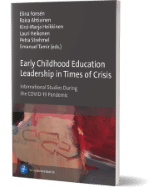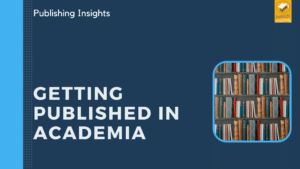Early Childhood Education Leadership in Times of Crisis.
International Studies During the COVID-19 Pandemic
edited by Elina Fonsén, Raisa Ahtiainen, Kirsi-Marja Heikkinen, Lauri Heikonen, Petra Strehmel and Emanuel Tamir
About the book
The COVID-19 pandemic has dramatically affected all aspects of professional and private life worldwide, including the field of early childhood education and care (ECE). This volume sheds light on leadership in ECE: How did leaders experience the challenges they were facing and what coping strategies did they apply in order to deal with the changes in everyday life and practices in ECE centres? Authors from twelve countries present empirical findings gaining information on different crisis management mechanisms in ECE systems around the world.
What is your publication about? Could you give us a brief overview?
The book is an edited collection of articles in area of educational sciences, and within that the book focuses on early childhood education and care (ECEC) from the perspective of leadership during the COVID-19 pandemic. The book is primarily targeted for researchers, university teachers and students in educational sciences globally, yet, the topics discussed throughout the book will be of high interest to other ECEC professionals, administrators and policy makers.
Year 2020 started the era of the COVID-19 pandemic that influenced the whole world dramatically including the field of early childhood education and care (ECEC). This book sheds light on the ECEC leaders’ experiences and discusses the phenomenon of ECEC leadership in various national contexts during the times of uncertainty. The book draws conclusions based on the empirical findings and provides future perspectives on the role of leadership in encountering the crises. The authors provide insights on the ways the pandemic changed everyday life and practices in ECEC centers and discuss the main challenges and coping strategies of the leaders. Through the original research reported throughout the book we learn what consequences the pandemic had on team relations of the staff and their internal and external communication structures. The book offers evidence-based information that benefits decision makers, scholars and practitioners in becoming more knowledgeable about different crisis management mechanisms in a variety of ECEC systems around the world. Further, the book is of interest to pre- and in-service training programs of ECEC leaders and teachers in universities and other educational institutions.
How did the idea for this publication come about?
The idea arose from an academic discussion among the book editors, in which various descriptions of the early childhood leaders’ dealings with the pandemic, over time, emerged. The insight was formed quite quickly that there are tangential and common factors between the early childhood systems in our countries (Germany, Finland, and Israel), but there were also descriptions of coping that differed from place to place. Although the pandemic is worldwide, the responses that the governments created to it were different. Considering that the structure of early childhood systems differs slightly from country to country, a collage was created that intrigued us. It was essential for us to understand how the leaders dealt with the epidemic, despite the diversity of the systems. We tried to understand the unique processes in each country and what is perceived as proper response during the crisis by the leadership. Later we expanded the research to other countries through more researchers who responded to our requests to participate in the book project.
What differences in leadership practice can be found in different countries or regions, and which are the most striking?
The national, regional, and local education policies, resources, and the organisation of ECE services form the framework withing which ECE is realized throughout the world. Consequently, that creates differences between the countries regarding prerequisites, professional capacity, and staffing that affecting ECE. However, instead of the search for differences, we would like draw attention to the value-base, practices, worries, and goals that drive the work of ECE professionals in a number of countries. Such similarities highlight the role of leadership in a crisis that passes through the contextual differences, whereas the different approaches that the authors of the articles have taken in this book emphasize the extent and complexity of the phenomenon.
In many areas, the pandemic has revealed and reinforced existing problems and inequalities. What has the pandemic revealed in the field of ECEC?
There are many similarities but also differences between countries that should be taken account when developing crisis leadership to educational field. Based on our articles the leader resilience and the support of the leader is essential to create quality pedagogics in unstable situation. Also, creating alternative ways to execute old routines in a new situation, as in pandemic using ICT and social media, were crucial to keep in touch with children and families during societal closures.
The epidemic raised different aspects of inequalities, including cultural differences between communities, different knowledge bases of parents, different accessibility to ICT and the infrastructures that support it. The pandemic has also sharpened the significance of personal resilience and social resilience of teams and ECE leaders. The inequality among the population groups and between parents and families affected their economic resilience and, accordingly, their patience’ reactions and adaptation to the crisis, something that the ECE leaders had to cope with in their daily activities.
What can be learned from the pandemic for other challenges and crises?
From the studies presented in the book, it is possible to learn about the tensions, the stresses and strains and the dilemmas ECEC leaders had to deal with while they tried to do justice to all different groups involved in an ECEC centre. The leaders had to act in the field of tension between the responsibility to protect the health of all groups involved in the centre and to maintain operations in the centres with good pedagogical quality for the children and to enable parents to pursue their work on the other hand. The studies reveal the meaning of mutual trust in the relationships to parents and colleagues, the importance of team participation in decision-making, and local organizational initiatives during a crisis, even if the ECEC centres were hindered to function at its best. Social resources and organisational resilience were crucial to master these demands and sometimes depended on the support from the ECEC political system. The articles present a diverse organizational picture in several countries. Emphasis on crisis management in early childhood systems, directions for dealing with crises, and directions for action to get out of a future crisis emerge from it. Early childhood leaders are able to find organizational patterns that they can adapt according to the organizational culture practiced in their country and locate personal paths that will allow them to successfully deal with systemic constraints and challenges arising from a crisis.
You can purchase the book as a print book or e-book in our shop:

Early Childhood Education Leadership in Times of Crisis.
International Studies During the COVID-19 Pandemic
About the editors
 Ph.D. Elina Fonsén, Associate Professor, Institute of Educational Leadership, The Faculty of Education and Psychology,
Ph.D. Elina Fonsén, Associate Professor, Institute of Educational Leadership, The Faculty of Education and Psychology,
University of Jyväskylä, Finland
Title of Docent from University of Eastern Finland 2019
Elina Fonsén previous work was University Lecturer and Deputy Director of the Department of Education The Faculty of Educational Sciences at the University of Helsinki, Finland. Other previous work experience consists of teaching and researching the university affiliated project coordinator, lecturer and teacher at the University of Tampere and as earlier career she was ECE teacher in the city of Pirkkala and the city of Tampere.
Fonsén’s dissertation in 2014 was about Pedagogical leadership in early childhood education. Her post-doctoral research interest focuses on the professional development of ECE teachers, leadership in the educational field and the quality of ECE pedagogy. She leads national and international research projects (Discourse of leadership in the diverse field of early childhood education, Vepo johtajuus 2035 – development and research project of leadership studies for the educational field, Eduleaders, Sääntökirjat etc.) and sub-studies (Ohoske, Vakatuki etc.). She is Member of the Board of Early Childhood Education Association Finland (ECEAF) and chief of coordination group member in the International Leadership Research Forum (ILRF -EC). Furthermore, she is member of the Executive Board of the Education, Administration and Research (SIG) of Finnish Society for Education.
 Raisa Ahtiainen, Ph.D. , University lecturer, Swedish-language teacher education, Faculty of Educational Sciences, University of Helsinki, Finland
Raisa Ahtiainen, Ph.D. , University lecturer, Swedish-language teacher education, Faculty of Educational Sciences, University of Helsinki, Finland
Title of docent, Faculty of Education and Welfare Studies, Åbo Akademi University, Vasa, Finland
Visiting researcher, School of Educational Sciences, Tallinn University, Estonia
Dr. Ahtiainen is active in research groups for Leadership in Educational Contexts (LeadEd), Centre for Educational Assessment (CEA), and Helsinki research community of special educational needs (SEN). Along with her research work and teaching at the faculty of educational sciences, Dr. Ahtiainen supervises several doctoral and master’s students, gives guest lectures, and collaborates with local schools and educational administrators. As a Principal Investigator (PI) and research leader Dr. Ahtiainen is involved in several in national and international projects that cover the themes of leadership in inclusive ECE and school context, questions of schooling, teaching and well-being in schools during the COVID-19 epidemic, the leadership for collaborative practices and teacher involvement, and leadership groups in schools.
 MA (Eds.) Kirsi-Marja Heikkinen, PhD Researcher, University teachers at the university of Helsinki
MA (Eds.) Kirsi-Marja Heikkinen, PhD Researcher, University teachers at the university of Helsinki
Kirsi-Marja Heikkinen previously worked as ECE center leader and teacher in Finland for almost twenty years. Heikkinen is now teaching future ECE teachers and working in a project VEPO johtaminen 2035 – development and research project of leadership studies for the educational field. Research topic of Heikkinen’s research is ECE leadership, leader identity and power relations between ECE leader and the working community.
 Lauri Heikonen, Ph.D., Post-doctoral researcher, Centre for Educational Assessment, Faculty of Educational Sciences, University of Helsinki
Lauri Heikonen, Ph.D., Post-doctoral researcher, Centre for Educational Assessment, Faculty of Educational Sciences, University of Helsinki
Dr. Heikonen works as a postdoctoral researcher at the Centre for Educational Assessment (CEA) at the University of Helsinki. He is a member of the Leadership in Educational Contexts research group (LeadEd) and along with research and teaching duties he supervises doctoral and master’s theses. In his research, Dr. Heikonen is interested in how teachers learn in the classroom, how they develop schools together as professional communities and what is the role of leadership in supporting such learning and development. He has worked in several national and international research projects and acted as a peer reviewer in top journals of the field (e.g., Journal of Teacher Education, Teaching and Teacher Education).
 Prof. Dr. Petra Strehmel, Professor for Psychology at the University of Applied Sciences in Hamburg, Germany.
Prof. Dr. Petra Strehmel, Professor for Psychology at the University of Applied Sciences in Hamburg, Germany.
Teaching in Bachelor and Master programs, focusing on the psychology of work and organisation and its application in the field of early childhood education and social work. Research projects on effects of financing systems for ECEC (e.g. voucher systems), stress and coping at the workplace, the role of leaders in the transfer of knowledge e.g. on children’s language acquisition, personnel development in ECEC centres and provider organisations as well as leadership, management and organisational development on different levels of the ECEC system. Previous research on adult development in connection with work experiences and career planning at the Universities in Munich and Augsburg as well as at the German Youth Institute. Member in a number of boards in the field of early childhood education and in national and international research projects.
 Ph.D. Emanuel Tamir, Senior lecturer, Educational Administration and Leadership program,
Ph.D. Emanuel Tamir, Senior lecturer, Educational Administration and Leadership program,
The Faculty of Education, Tel-Hai college’ Israel.
Emanuel Tamir is a head of master’s degree in Educational Administration and Leadership program at Tel-Hai college. The program includes three streams: Management of early childhood education systems, Management of education systems for at-risk youth and children, and Education system administration.
Other previous work experience consists of being a consultant to various public organizations, management role in educational organizations (including in the academy), academic research, and academic teaching.
Tamir’s dissertation (Hebrew University of Jerusalem, 2005) was about the systematic development of teachers’ unions. His research focuses on changes, dynamics, reforms, and decision-making in early childhood education systems and schools.

